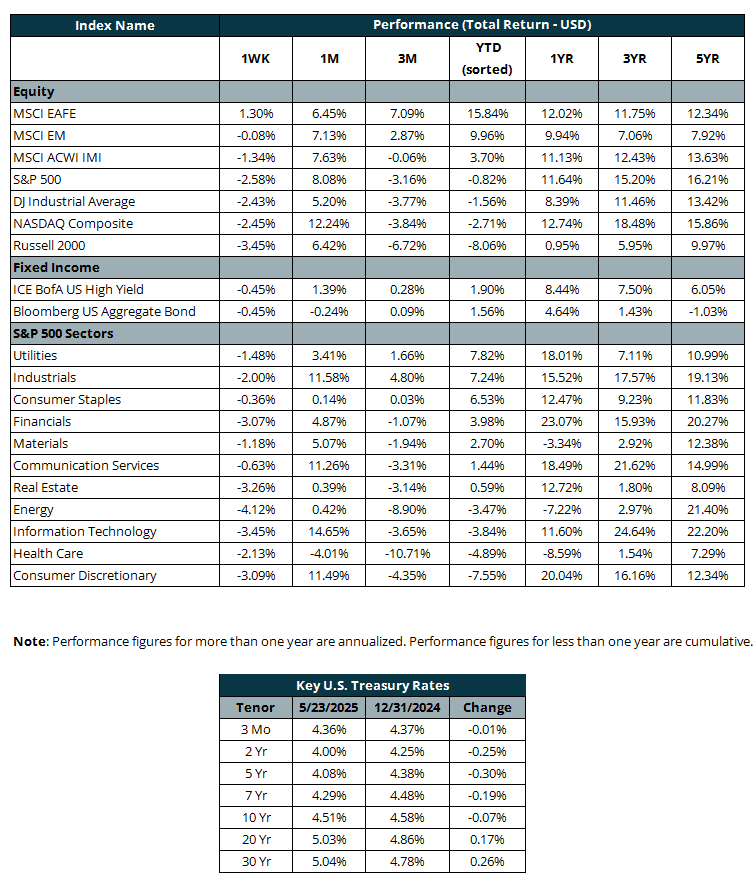Disappointing Treasury Auction Dents US Stock and Bond Markets

by Sequoia Financial Group

by Sequoia Financial Group
Domestic stock and bond markets both closed the week in red territory after Treasury yields rose in response to a weak auction. The S&P 500 finished the week down 2.6%, bringing 2025 year-to-date (YTD) losses to 0.8%. The Bloomberg US Aggregate Bond Index closed the week down 0.4%, although it is up 1.6% YTD.
Bond investors are exhibiting heightened sensitivity regarding the federal government’s worsening budget situation. On Wednesday, Congress narrowly approved the “One Big Beautiful Bill”, the White House’s tax and spending bill. The bill extends the cuts of the Tax Cuts and Jobs Act of 2017 (TCJA), which were set to expire this year. It also increases certain deduction limits of the TCJA and trims spending on federal programs, including Medicaid. Despite certain spending cuts, deficits are projected to increase to nearly $3 trillion dollars over the next 10 years. The bill now moves to the Senate, where Republican senators have until the bill’s July 4 target date to gather enough support for approval.
Given prospects for a worsening budget deficit, bond investors have shown greater reluctance to lend to the US government, especially over long periods. The yield on the 30-year US Treasury ended the week at 5.04%, up from 4.89% a week prior. The yield on the 10-year, an indicator of corporate borrowing costs, rose to 4.51% from 4.43% last week. A 4.5% yield on the 10-year Treasury has been a psychological threshold for US stock investors. The S&P 500 and all its sectors finished down for the week.
Developed international markets fared better. The MSCI EAFE Index returned 1.3% for the week and has returned 15.8% YTD. A weakening US dollar has driven much of the strength in international markets. Waning demand for USD-denominated securities has led to an 8.7% YTD decline in the greenback (DXY). When the dollar declines, corporate earnings denominated in foreign currencies are worth more to US investors. The Japanese Yen has gained so much this year (+10.1%) against the USD that the iShares MSCI Japan ETF (EWJ) has gained 9.1% YTD, despite a negative return for the Nikkei 225. International stock market outperformance this year emphasizes the importance of holding a globally diversified portfolio.
The last few weeks saw a calmer trade backdrop, but that changed on Friday when President Trump announced 50% tariffs on the European Union. However, European stocks quickly recovered their Friday losses when President Trump announced the effective date of these tariffs would be pushed to July 9 from June 1. The tariff situation is ever changing, and Sequoia Research will continue to monitor its impact on the markets.

The views expressed represent the opinion of Sequoia Financial Group. The views are subject to change and are not intended as a forecast or guarantee of future results. This material is for informational purposes only. It does not constitute investment advice and is not intended as an endorsement of any specific investment. Stated information is derived from proprietary and nonproprietary sources that have not been independently verified for accuracy or completeness. While Sequoia believes the information to be accurate and reliable, we do not claim or have responsibility for its completeness, accuracy, or reliability. Statements of future expectations, estimates, projections, and other forward-looking statements are based on available information and Sequoia’s view as of the time of these statements. Accordingly, such statements are inherently speculative as they are based on assumptions that may involve known and unknown risks and uncertainties. Actual results, performance or events may differ materially from those expressed or implied in such statements. Investing in equity securities involves risks, including the potential loss of principal. While equities may offer the potential for greater long-term growth than most debt securities, they generally have higher volatility. Past performance is not an indication of future results. Investment advisory services offered through Sequoia Financial Advisors, LLC, an SEC Registered Investment Advisor. Registration as an investment advisor does not imply a certain level of skill or training.









Markets End Volatile Week Higher